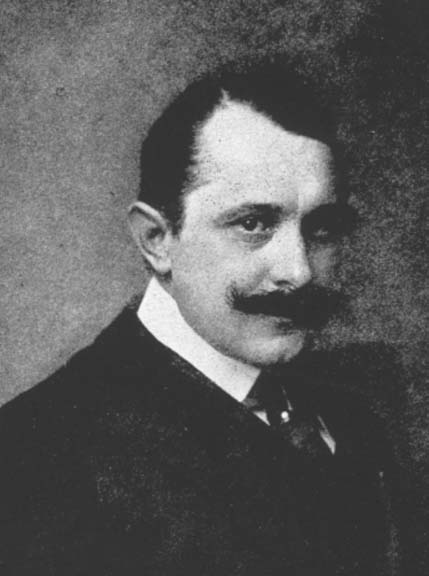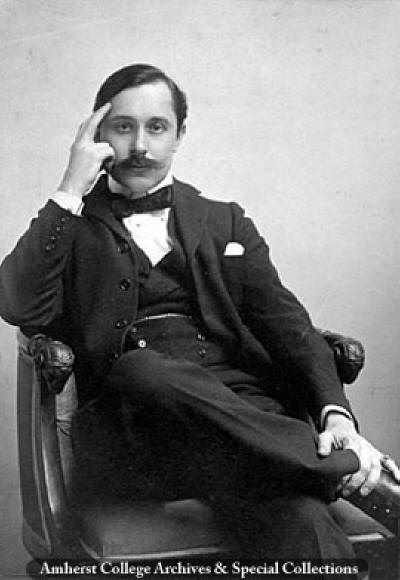

Queer Places:
Amherst College, Amherst, MA 01002
Woodlawn Cemetery, 4199 Webster Ave, Bronx, NY 10470
 Clyde Fitch (May 2, 1865 – September 4, 1909) was an
American
dramatist, the most popular writer for the Broadway stage of his time (c.
1890–1909). He became known as the "Maker of Actresses" and launched the
careers of numerous leading ladies of the period, including
Maude
Adams, Ethel Barrymore, Maxine Elliott, and Clara Bloodgood.
Clyde Fitch (May 2, 1865 – September 4, 1909) was an
American
dramatist, the most popular writer for the Broadway stage of his time (c.
1890–1909). He became known as the "Maker of Actresses" and launched the
careers of numerous leading ladies of the period, including
Maude
Adams, Ethel Barrymore, Maxine Elliott, and Clara Bloodgood.
Clyde Fitch was the most successful and prolific dramatist of his time, producing nearly sixty plays in a twenty-year career. He wrote witty comedies, chaotic farces, homespun dramas, star vehicles, historical works, stark melodramas, and adaptations of European successes, but he was best known for his society plays, mirroring themes found in the novels of Henry James and Edith Wharton. In fact, Fitch collaborated with Wharton on a stage adaptation of her House ofMirth. He was also a gay man, although that gentler adjective was not the term of his time. He was bullied in school and baited by critics throughout his career for what they supposed of his private life. He responded with impressive strength and integrity. He was, at least for a short time in the late 1880s and early 90s, Oscar Wilde’s lover, and Wilde influenced his early plays, but Fitch’s study of Ibsen and other European dramatists inspired him to pursue the course of naturalism. As he became more successful, he took greater control of the staging and design of his plays. He was a complete man of the theatre and among the first names enrolled in New York’s theatrical hall of fame.
Born in Elmira, New York, and educated at Holderness School and Amherst College (class of 1886), William Clyde Fitch wrote over sixty plays, thirty-six of them original, ranging from social comedies and farces to melodrama and historical dramas.[1]
His father, Captain William G. Fitch, a graduate of West Point and Union officer in the Civil War, encouraged his son to become an architect or to engage in a career of business; but his mother, Alice Clark, in whose eyes he could do no wrong, always believed in his artistic talent. (For her son's final resting place, she would hire the architectural firm of Hunt & Hunt to design the sarcophagus set inside an open Tuscan temple at Woodlawn Cemetery in the Bronx.) Fitch graduated from Amherst in 1886, where he was a member of Chi Psi Fraternity. As an undergraduate, "he dazzled his fellow students with his flair for dress and his virtuosity as an amateur actor."[2]

Fitch was one of the first American playwrights to publish their plays. His first work of note was Beau Brummell (1890), set in the English Regency, which became a lucrative showcase for actor Richard Mansfield (1857–1907), who would play the title role for the rest of his life. His 1892 play Masked Ball (an adaption from Alexandre Bisson's Le Veglione) would be the first time that producer Charles Frohman put Maude Adams opposite John Drew Jr., a pairing which led to many successes. In 1901, Captain Jinks of the Horse Marines made a star of Ethel Barrymore;[3][4] "Fitch had a special talent for writing female characters that female stars could act agreeably," theater critic and historian Brooks Atkinson wrote of him in his history of Broadway.[5]
Fitch was renowned in his time for works such as Nathan Hale (1898), The Climbers (1901), The Girl with the Green Eyes (which ran 108 performances at the Savoy Theatre in 1902 and starred Robert Drouet as John Austin), The Woman in the Case (which also starred Drouet and ran for eighty-nine performances at the Herald Square Theatre in 1905),The Truth (1907), The City (1909), and Girls (1910). His works were popular on both sides of the Atlantic. His play based on the heroine of John Greenleaf Whittier's poem Barbara Frietchie met with mixed reviews in 1899 because of the romance he added to the tale, but it would be successfully revived a number of times. In 1896, he wrote the lyrics to a popular song Love Makes The World Go 'Round, with an arrangement by William Furst.
In December 1905, Fitch visited novelist Edith Wharton in her Park Avenue apartment to discuss collaborating on a dramatization of her new novel The House of Mirth. Wharton was not a fan of Fitch's plays, which she regarded as more commercial than artistic, but knew him to be a consummate professional and the most likely writer to be able to bring Lily Bart's story to the stage. She also enjoyed his ironic sense of humor. (Wharton described her visitor as "a plump showily dressed little man, with his olive complexion and his beautiful Oriental eyes full of wit and understanding.") In the following months, they met in Paris and at the Mount, Wharton's estate in Massachusetts, to work on drafts, with Wharton taking responsibility for the dialogue and Fitch for the plot revisions. At one point, when the work was not going well, Wharton in frustration asked Fitch why he had ever thought her novel could be turned into a successful play. Incredulous, Fitch replied that he never had thought that it was a plausible endeavor. It then became clear, to their great amusement, that each had been set up (probably by producer Charles Frohman) to believe that the project had been enthusiastically initiated by the other and, seduced by the thought of working with a famous person in another field, they had each agreed to collaborate. The play was the critical and commercial failure Wharton feared it would be, but the two became good friends.[6]
Fitch's career spanned a brief two decades, but he earned upwards of $250,000 from his plays at a time when a dollar a day was the working wage. He directed a few of his plays himself and was closely involved in the production of all of them. He was the first American playwright to be taken seriously and at one time managed to have five plays running simultaneously on Broadway. "Once Clyde Fitch got his foot in the door," Brooks Atkinson wrote, "he dominated Broadway drama."[7]
A generous host with an engaging personality, Fitch was renowned as a raconteur. His invitations to "Quiet Corner," his estate in Greenwich, Connecticut, were much sought-after. He was a close friend of designer Elsie de Wolfe, who helped him find many of the furnishings for his Connecticut mansion, Manhattan townhouse, and other residences. At one point she said, "He knows more about women than most women know about themselves." About his taste for luxury and his work habits, a friend remarked, "He lives like sultan and works like a dock laborer on an eighteen-hour shift."[8]
A dandy by his early teens, Fitch knew that in school he was seen as a sissy, but he said, "I would rather be misunderstood than lose my independence." In fact, he seems to have been understood all too well; correspondence of the time points to a likely relationship, however brief, with Oscar Wilde. James Gibbons Huneker, a critic sympathetic to Fitch's wit and sense of the ironic, dropped a few broad hints about the playwright's sexuality in his columns when commenting on his "feminine manner of apprehending meanings of life," his not always believably masculine dialogue, and his reserve when dealing with passion between men and women. Huneker also wrote that, if Fitch slowed down and lived long enough, he might actually turn out a "masterpiece in miniature."[9]
Fitch suffered from attacks of appendicitis but refused his American doctor's recommendation of surgery, instead trusting the specialists in Europe who assured him that they could effect a cure over time without surgery. He left for Europe in the spring of 1909 against his doctor's wishes.
While staying at the Hotel de la Haute Mère de Dieu at Châlons-en-Champagne in France, he suffered what would be a fatal attack. He underwent surgery by a local doctor, rather than travel to Paris, and died from blood poisoning. His body was returned from France where it was entombed for a time in the Swan Callendar Mausoleum at Woodlawn Cemetery, in The Bronx, New York City which belonged to a friend.
In 1910, the body was removed and taken to New Jersey for cremation and the ashes were returned to the Swan Callendar Mausoleum until the Hunt & Hunt monument was finished. His ashes were then placed in a sarcophagus (where his parents' ashes would later join his) in their own mausoleum in Woodlawn Cemetery. A memorial exists at the Clyde Fitch Memorial Room in Converse Hall at Amherst.
Since his death, Fitch has fallen into obscurity but some of his plays were revived in repertory theaters in the twentieth century or made into films and adapted for television. The Archives and Special Collections at Amherst College holds a collection of his papers.
My published books: